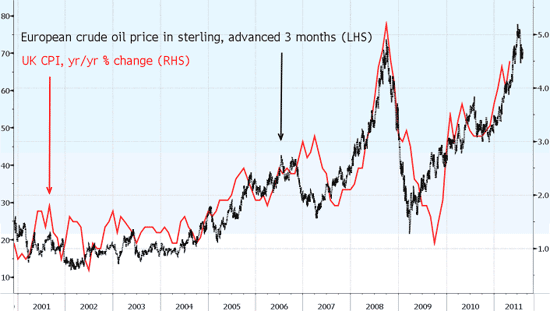
Indicator: Crude oil priced in pounds
Updated 26 May 2011
Oil’s wide use as a raw material and its critical role in transport costs mean that its price has a major impact on the UK’s inflation rate.
What’s the latest?
Oil in US dollars has been soaring in recent months – both crude demand and price speculation have increased while the Fed’s money printing via quantitative easing (QE) has hurt America’s currency. North African/Middle Eastern unrest has raised fears over possible supply problems. But oil prices have recently been very volatile on some signs of falling US usage. In sterling, which has been firm against the dollar, the cost of European crude is now £71/barrel, up by 17% in 2011.
In April, UK CPI (consumer price index) inflation was up by 4.5% year-on-year, well over twice the Bank of England’s 2% target and the highest level since October 2008. Meanwhile UK RPI – the retail price index, which includes housing costs – is 5.2% more than a year ago and just short of its highest level for almost 20 years.
What does this mean for UK inflation?
Source: Bloomberg
Oil prices lead year-on-year percent changes in our cost of living by around three months. And Britain already has a growing inflation problem despite a slight dip in the March rate. Higher oil prices still look set to drive UK CPI towards a 4.5% annual increase.
•
Go back the UK inflation indicators main page